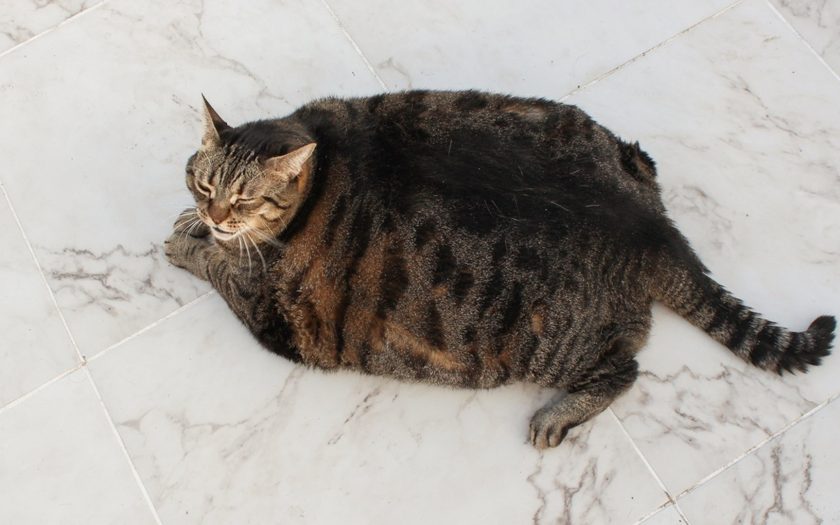Fact 1. Strain on the heart.
When a cat is overweight, its heart has to work harder—every day, without rest. Extra kilograms mean additional tissues that require blood supply, oxygen, and nutrients. It’s the heart’s job to provide all of this, forcing it to function more intensively than under normal conditions. Being overweight significantly increases the likelihood of developing serious cardiovascular disorders, including hypertension and heart rhythm disorders. Whiling early symptoms may go unnoticed, over time they can manifest as fatigue, labored breathing after play, or even apathy. For instance, if your cat used to play, chase toys, or jump onto windowsills, but now quickly tires or avoids activity altogether, it may be due to an overburdened heart that can no longer keep up. Weight control is not just about appearance—it’s essential for protecting vital organs.
Fact 2. Breathing problems.
When a cat becomes overweight, it affects not only its appearance but also its ability to breathe freely. Excess fat that accumulates in the chest and abdomen literally squeezes the lungs and diaphragm, making it difficult to breathe in air properly. As a result, the cat has to breathe more often, and oxygen saturation decreases. This is especially noticeable when moving, playing, or in the heat. The animal may breathe with an open mouth, quickly become out of breath after minimal exertion, or look for a cool place to restore breathing. For example, if your cat starts lying on its side, breathing deeply, or even avoiding activity after a few minutes of play, this is an alarm signal. Sometimes owners perceive this as ‘laziness’ or ‘calmness’, but in fact it is a consequence of respiratory dysfunction caused by excess weight. Obesity can also aggravate the symptoms of pre-existing respiratory diseases, particularly in cats with a flat face (e.g. Persians or British), which already have a tendency to breathe heavily.
Fact 3. Joint problems and arthritis.
Excess Weight — A Serious Challenge for a Cat’s Joints. Unlike humans, cats have a highly flexible and dynamic musculoskeletal system designed for jumping, running, and active movement. However, when body weight exceeds the normal range, the joints and cartilage are subjected to excessive stress, which gradually leads to wear and tear. Overweight cats are much more likely to develop arthritis and degenerative joint changes—even at a relatively young age. These conditions are often accompanied by pain, stiffness, and reluctance to jump, climb stairs, or play. The cat becomes less active, lies down more frequently, and when it does move, its movements appear slow and cautious. Many owners notice that their cat no longer jumps onto a favorite windowsill or lies in unusual positions, seemingly to avoid putting pressure on its legs. These can be early signs of joint inflammation caused by excess body weight. Arthritis in cats is difficult to cure completely, but it can be prevented or significantly slowed down if the cat’s weight is addressed in time. At the same time, if the condition worsens, it is extremely important to consult a veterinarian, who can perform a thorough examination and determine the cause of joint pain or stiffness. Joint health is directly linked to your pet’s comfort and quality of life, so regular weight control, moderate activity, and veterinary supervision are essential in preventing serious illnesses.
Fact 4. Decreased quality of life.
When an animal’s body is heavier than normal, it affects not only the health of individual organs but also its behavior, mood, and activity levels. Even simple things—walking to the food bowl, climbing stairs, or jumping onto a favorite spot—can become difficult. This can lead to withdrawal and may even trigger behavioral issues such as aggression or anxiety. You may notice that your pet is losing its spark—your cat is no longer playful, shows little curiosity, and doesn’t respond to familiar toys or people. These are clear signals that indicate the need to revise the diet, increase physical activity, and follow the schedule of preventive examinations by a veterinarian. This is especially important for senior cats, who naturally undergo age-related changes. Their condition can be supported with specialized dietary supplements that help improve quality of life. For example, Cholodin Feline promotes healthy nervous system function and supports cognitive health, which is especially relevant for aging cats. Derma-3 Softgels, which contain omega-3 fatty acids, help reduce inflammation and support skin, coat, and joint health. A comprehensive approach—including proper nutrition, physical activity, medical care, and high-quality supplements—is key to your cat’s well-being and helps ensure a happy, active, and comfortable life at every stage of age.

